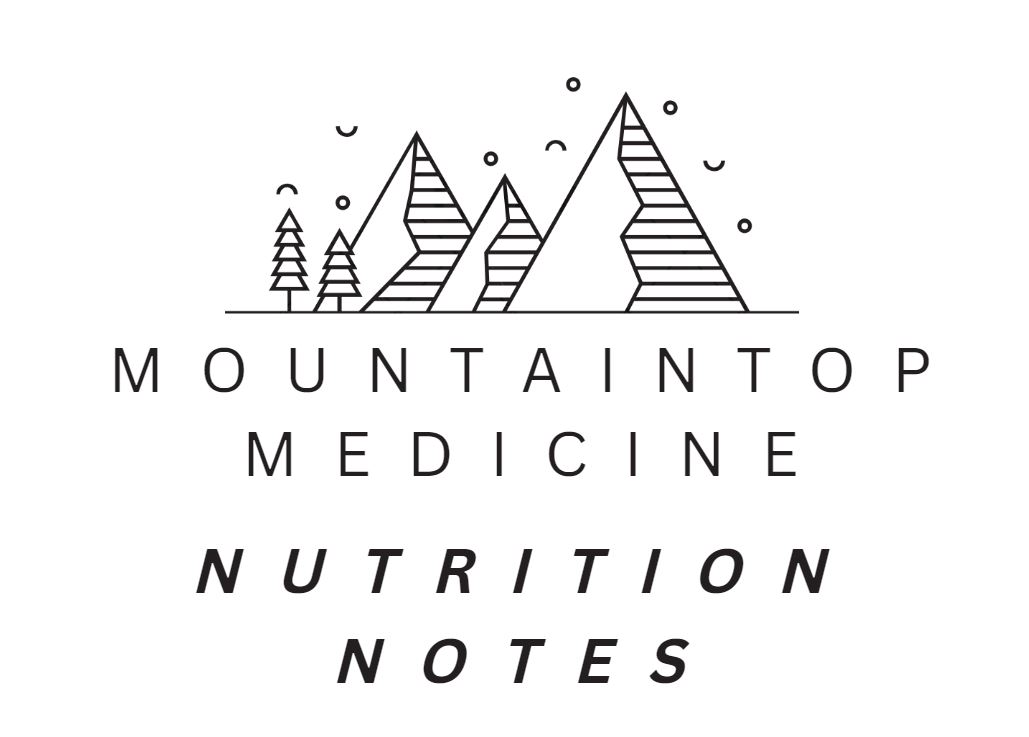Mountaintop Medicine: Nutrition Notes — Don’t Forget Your Vitamins!

Hello again! Welcome back to Mountaintop Medicine: Nutrition Notes.
More than likely you’ve heard how important vitamins are. I’m betting your doctor or even your mom has told you to take multivitamins daily. But what exactly is a vitamin?
Vitamins are micronutrients, meaning they are needed in much smaller amounts than other nutrients like carbohydrates, fats, and proteins. Although, they are essential and play many important roles in our body’s function and overall health. There are fat-soluble and water-soluble vitamins depending on how they are absorbed. Most vitamins are water-soluble, meaning they dissolve in water. In contrast, fat-soluble vitamins resemble oil and do not dissolve in water.
This article provides a comprehensive overview of each of the fat-soluble and water-soluble vitamins that includes function, health benefits, food sources, and symptoms of deficiencies for each.

Leah Gardner, EPH Registered Dietitian
The Fat-Soluble Vitamins
Fat-soluble vitamins are much better absorbed into your bloodstream when you eat them with fats, such as olive oil, butter, avocados, nuts and seeds, and fatty fish.
Vitamin A: This antioxidant helps us to maintain eyesight, healthy skin, strong immune system, and a functional digestive system. Food sources include liver, fortified milk, yellow and orange fruits and vegetables such as mango, carrots, sweet potatoes, yellow squash, pumpkin, and green leafy vegetables like spinach. A deficiency in vitamin A can cause eyesight issues such as nyctalopia, xerophthalmia, and bitot’s spots that can all lead to blindness, as well as growth retardation and dry skin.
Vitamin D: This vitamin is necessary for maintenance of blood calcium and phosphorus levels and proper mineralization of our bones. It is highly absorbable from sunlight but is also found in food sources such as egg yolks, fatty fish, fortified milk, and mushrooms. A deficiency in vitamin D can cause children to develop rickets and adults to form osteomalacia, both involve softening of the bones.
Vitamin E: This is another antioxidant that interrupts free radicals from causing illness and aging and protects all our cell membranes. Food sources include vegetable oils, nuts and seeds, whole grains, and green vegetables. Having a deficiency in this vitamin can cause peripheral neuropathy and breakdown of our red blood cells.
Vitamin K: This vitamin is necessary for adequate blood clotting and bone metabolism. It can be found in any green vegetable and in beans and legumes. Deficiency is defined by serious conditions such as diminished blood clotting and internal bleeding.
The Water-Soluble Vitamins
Unlike fat-soluble vitamins, water-soluble vitamins are not stored in the body. For this reason, you should try to get them regularly from your diet.
Vitamin B1 (Thiamin): This vitamin is essential for our body’s metabolism of carbohydrates such as grains, dairy products, fruits, and vegetables. Vitamin B1 is found in pork, liver, whole grains, and in wheat germ. A deficiency causes nerve impairment known as Beriberi. Wernicke’s encephalopathy is common in alcoholics because excessive alcohol intake suppresses vitamin B1 absorption.
Vitamin B2 (Riboflavin): Needed to produce red blood cells, for energy metabolism, and to create proteins from DNA used for gene expression. It is commonly found in milk, but is also in liver, meat, and fish. Fun fact- Did you know that UV rays from sunlight can destroy vitamin B2, which is why milk comes in an opaque container? Deficiency in this vitamin can give you a dry cracked mouth, magenta tongue, and can cause growth failure.
Vitamin B3 (Niacin): This vitamin is a crucial part of a healthy diet as it is required for every cell to make energy and to metabolize the food we eat. It is found in grains, yeast, peanuts, milk, and rice. A deficiency in vitamin B3 can cause a serious condition called Pellagra, which is characterized by diarrhea, dermatitis, dementia, and even death. Deficiency in this vitamin can also cause skin rashes and a red tongue.
Vitamin B5 (Pantothenic Acid): This vitamin is also necessary for energy metabolism. It helps our bodies to create fatty acids. Food sources include animal proteins such as meat and dairy products, legumes, and grains. Pantothenic Acid is common in most foods we eat, so deficiency is rare. However, lack of B5 can cause tingling in the feet, also known as paresthesia.
Vitamin B6 (Pyridoxine): Needed for our bodies to breakdown proteins and absorb their amino acids. It is mostly found in beef, pork, wheat, and yeast. Deficiency can cause peripheral neuropathy, anemia, seizures, dermatitis, and tongue inflammation.
Vitamin B7 (Biotin): Used in energy metabolism and helps to maintain hair, skin, and nails. It is found in egg yolk, yeast, liver, and in kidneys. A deficiency can cause dermatitis, tongue inflammation, hair loss, and muscle pain.
Vitamin B9 (Folate): Necessary to produce red blood cells and DNA. It is also essential for pregnant women to prevent the fetus from developing neural tube defects like spina bifida. Food sources of folate include fortified grains, such as breads, cereals, as well as fruits, vegetables, legumes, and liver. Deficiency in vitamin B9 causes diarrhea, fatigue, irritability, anemia and neural tube defects in babies.
Vitamin B12 (Cyanocobalamin): It is required for fat and protein metabolism and for normal blood formation and neurological function. This is a friendly reminder for all vegetarians and vegans to supplement with vitamin B12 because it can only be found in animal products like meat and dairy. A deficiency can cause anemia.
Vitamin C: This water-soluble vitamin is another antioxidant that supports our immune system, is needed to make collagen for wound healing, and enhances iron absorption. Be sure to eat sources of vitamin C along with sources of iron such as beef, fish, shellfish, liver, spinach, legumes, pumpkin seeds, and quinoa. Vitamin C is found naturally in citrus fruits, berries, kiwi, broccoli, and red bell peppers. Deficiency causes scurvy, petechiae, bleeding gums, and poor wound healing.
If you have any questions or if there are any nutrition-related topics that you would like me to discuss, please reach out at LGardner@EPH.org.


